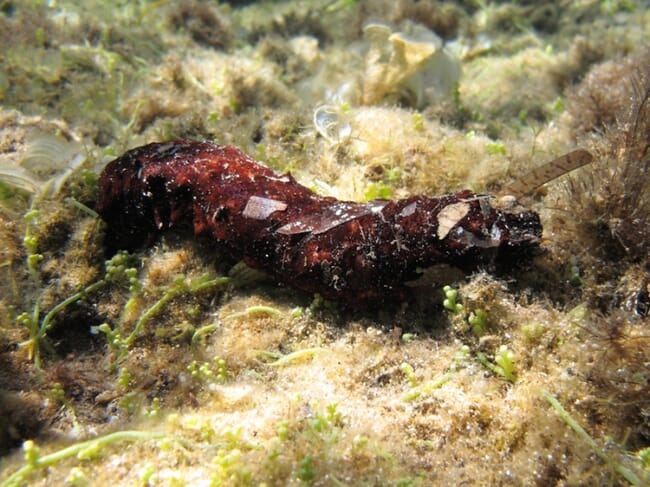
Researchers have found that adding sea cucumbers to aquaculture projects can reduce the environmental impacts of marine fish farming whilst providing a high value extra product © Roberto Pillon
New research led by the University of Stirling’s Institute of Aquaculture shows how sea cucumbers – a delicacy in Asia – can flourish by feeding and growing on organic waste released from commercial fish farms in the Mediterranean.
The discovery means adding sea cucumbers can reduce the environmental impacts of marine fish farming whilst providing a high value extra product. Mediterranean sea cucumbers can fetch between €30/kg dried and €120/kg as processed product, where farmed sea bream are currently worth just €6 per kilo.
PhD researcher at the Institute of Aquaculture, Karl Cutajar, said: “This research shows the feeding connectivity between fish and sea cucumbers under marine commercial fish cages, which means that farming them together in an integrated multi-trophic aquaculture (IMTA) system is viable.
“Our results show that sea cucumbers take up fish farm waste and how this helps the sea cucumber to grow.
“Something that removes organic waste, which can have a negative impact on the seafloor, whilst being a valuable commercial product, without the need for feed input, is an exciting discovery that presents environmental and economic opportunities.”
In Asia sea cucumbers are highly in demand for food but supply is short, even causing overfishing in some areas. Sea cucumbers also have antibacterial and anticancer properties, and are increasingly being investigated for medicinal and pharmaceutical uses worldwide.
Different varieties of sea cucumber also grow in colder waters such as those around the UK, and research is beginning to explore their value and impact, especially around the processing and use of organic waste from marine aquaculture.

The research was carried out with AquaBiotech Group and the University of Palermo
This research, part of the European Union’s Horizon 2020-funded project Tools for Assessment and Planning of Aquaculture Sustainability (TAPAS), carried out with AquaBiotech Group and the University of Palermo, combined two analytical techniques to prove the cucumbers were successfully processing the fish waste. Stable isotopes, used to assess diet, showed that the sea cucumbers were using the fish waste as their dominant food source. Fatty acid analysis in sea cucumbers grown near fish cages showed the presence of terrestrial, plant-based ingredients that could only have come from fish feed, showing that these sea cucumbers were using this source of organic waste to grow.
Angus Sharman, of fish farm MFF Ltd in Malta, where the research took place, said: “As the demand for seafood grows, MFF Ltd strongly believes in the need for the development of sustainable aquaculture, possibly through IMTA systems such as this. The application of this technology across Mediterranean aquaculture now seems very possible.”
Mr Cutajar added, “our research showed that the nutritional benefits of sea cucumbers produced near fish cages may have the potential to create economic value for producers to invest in sustainably farmed products and, as preference for eco-labelled products increases, these findings could encourage product diversification through IMTA.”
Professor Trevor Telfer of the Institute of Aquaculture, who oversaw the research, said, “there is increasing interest in IMTA systems in aquaculture, as there is in circular economy systems in other industries, as a way to find sustainable solutions to future challenges in seafood production. We are very excited by these findings.”




